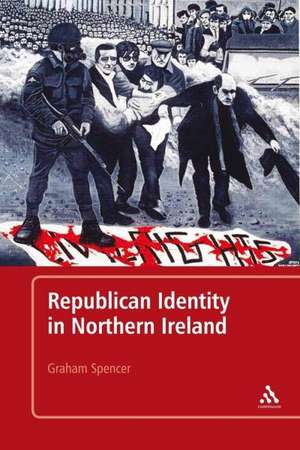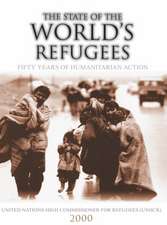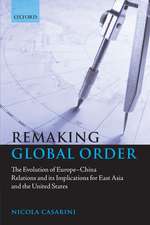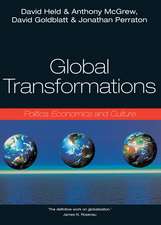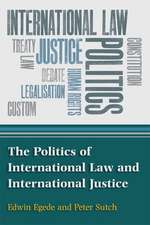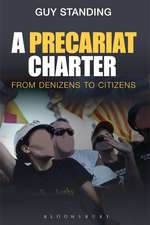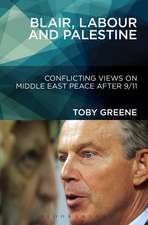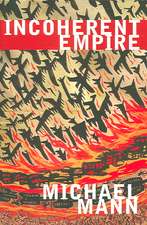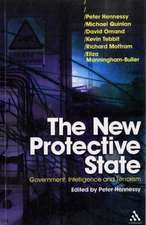From Armed Struggle to Political Struggle: Republican Tradition and Transformation in Northern Ireland
Autor Dr. Graham Spenceren Limba Engleză Paperback – 29 iul 2015
| Toate formatele și edițiile | Preț | Express |
|---|---|---|
| Paperback (1) | 239.59 lei 6-8 săpt. | |
| Bloomsbury Publishing – 29 iul 2015 | 239.59 lei 6-8 săpt. | |
| Hardback (1) | 832.99 lei 6-8 săpt. | |
| Bloomsbury Publishing – 29 iul 2015 | 832.99 lei 6-8 săpt. |
Preț: 239.59 lei
Preț vechi: 274.43 lei
-13% Nou
Puncte Express: 359
Preț estimativ în valută:
45.85€ • 49.96$ • 38.63£
45.85€ • 49.96$ • 38.63£
Carte tipărită la comandă
Livrare economică 24 aprilie-08 mai
Preluare comenzi: 021 569.72.76
Specificații
ISBN-13: 9781441140647
ISBN-10: 1441140646
Pagini: 296
Dimensiuni: 152 x 229 x 23 mm
Greutate: 0.45 kg
Editura: Bloomsbury Publishing
Colecția Bloomsbury Academic
Locul publicării:New York, United States
ISBN-10: 1441140646
Pagini: 296
Dimensiuni: 152 x 229 x 23 mm
Greutate: 0.45 kg
Editura: Bloomsbury Publishing
Colecția Bloomsbury Academic
Locul publicării:New York, United States
Caracteristici
Groundbreaking study that uses personal interviews with Irish Republicans to explore changes in republican identity
Notă biografică
Graham Spencer is Reader in Politics, Conflict and the Media at the University of Portsmouth, UK and Distinguished Senior Research Fellow at the Edward M. Kennedy Institute for Conflict Intervention, NUI, Maynooth, Ireland.
Cuprins
AcknowledgementsIntroductionChapter One: ImaginationMythMartyrdomMetaphorChapter Two: HistoryOrigins and dynamicsRe-emergenceMilitancyHunger and transitionChapter Three: CatholicismHistory and contextReasoning and moralityThe Catholic Church and republicanismCatholic perspectives on republicanismRepublican perspectives on CatholicismChapter Four: PoliticsDialogues with nationalismSDLP perspectivesChapter Five: PeaceThe Good Friday AgreementBritish and Irish Official perspectivesEndgame: After Good FridayChapter Six: Rebels and ReconciliationThe 'dissident' threatClaiming the past to shape the futureConclusionBibliographyIndex
Recenzii
Spencer has made a significant contribution to the existing literature on Provisional Republicanism. From Armed Struggle to Political Struggle will be of interest to anyone working on the Troubles and the peace process.
Graham Spencer's From Armed Struggle to Political Struggle: Republican Tradition and Transformation in Northern Ireland is a much needed and important addition to historical studies of the "Troubles" and the peace process ... The book usefully draws together extensive literature on the PIRA and the 1981 hunger strike, making a valuable contribution to the field with extensive, high-profile interviews and the exploration of a republican "social imaginary".
An accomplished account of conflicts and dialogues within and between nationalist political parties (Sinn Fein and the SDLP) and the Provisional IRA from the late 1960s to the early twenty-first century.
In this penetrating study, Graham Spencer shines a powerful light into the inner recesses of the Republican mind-set in the Northern Ireland peace process in describing how a small but resolute leadership cadre, with cunning and pertinacity, with verbal dexterity and great personal courage, over a period of years, managed to persuade a mainly clandestine organisation wedded to violence as a medium of political discourse to decommission the Armalite and embrace the ballot-box as the only means to effect change in a modern democratic society. In the process they altered the Republican psyche, formed in a matrix of Irish history, an overweening victimhood, moral ambiguity and Roman Catholic precepts and practices. More widely in the field of conflict management and resolution, there are lessons in the importance of language, and of the need for leaders constantly to redefine terms and to spend as much time negotiating them with their own supporters as with the opposition.This book is an important contribution to our understanding of what went on in key parts of the Northern Ireland Peace process, and more widely as a handbook for analysts and those who would intervene in other seemingly intractable conflicts.
Graham Spencer provides us with an insightful analysis of what shapes republican thinking and the changes it has undergone since the peace process started. A valuable and essential contribution.
This book contains some remarkably illuminating insights into the evolving republican mind-set from significant participants in the Peace Process. Getting these voices to speak so frankly says much about the author's unusual ability to build trust. He has weaved their contributions into a fascinating and important addition to the narrative of the Troubles.
Graham Spencer's From Armed Struggle to Political Struggle: Republican Tradition and Transformation in Northern Ireland is a much needed and important addition to historical studies of the "Troubles" and the peace process ... The book usefully draws together extensive literature on the PIRA and the 1981 hunger strike, making a valuable contribution to the field with extensive, high-profile interviews and the exploration of a republican "social imaginary".
An accomplished account of conflicts and dialogues within and between nationalist political parties (Sinn Fein and the SDLP) and the Provisional IRA from the late 1960s to the early twenty-first century.
In this penetrating study, Graham Spencer shines a powerful light into the inner recesses of the Republican mind-set in the Northern Ireland peace process in describing how a small but resolute leadership cadre, with cunning and pertinacity, with verbal dexterity and great personal courage, over a period of years, managed to persuade a mainly clandestine organisation wedded to violence as a medium of political discourse to decommission the Armalite and embrace the ballot-box as the only means to effect change in a modern democratic society. In the process they altered the Republican psyche, formed in a matrix of Irish history, an overweening victimhood, moral ambiguity and Roman Catholic precepts and practices. More widely in the field of conflict management and resolution, there are lessons in the importance of language, and of the need for leaders constantly to redefine terms and to spend as much time negotiating them with their own supporters as with the opposition.This book is an important contribution to our understanding of what went on in key parts of the Northern Ireland Peace process, and more widely as a handbook for analysts and those who would intervene in other seemingly intractable conflicts.
Graham Spencer provides us with an insightful analysis of what shapes republican thinking and the changes it has undergone since the peace process started. A valuable and essential contribution.
This book contains some remarkably illuminating insights into the evolving republican mind-set from significant participants in the Peace Process. Getting these voices to speak so frankly says much about the author's unusual ability to build trust. He has weaved their contributions into a fascinating and important addition to the narrative of the Troubles.
